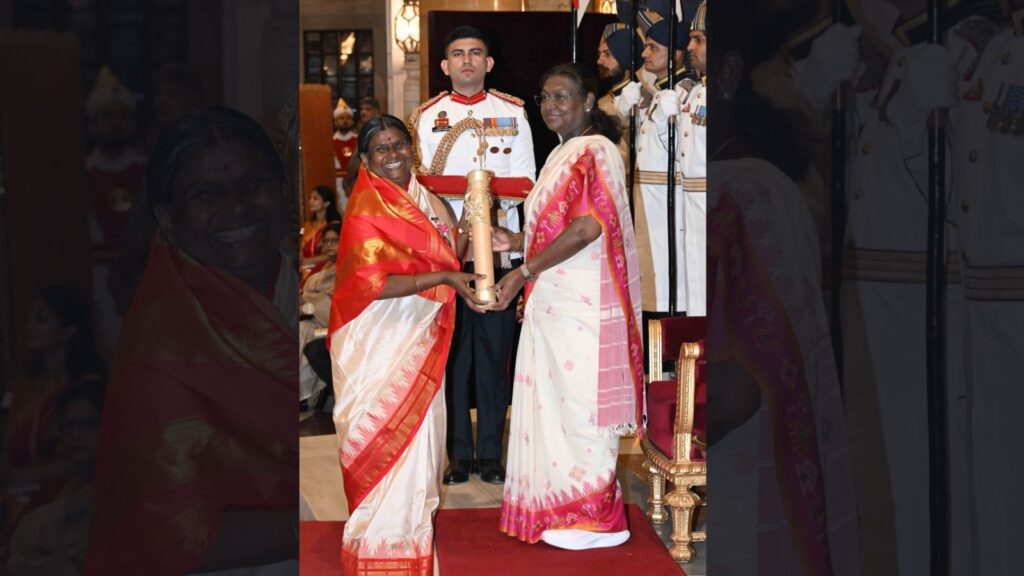In 1994, Dr Vijayalakshmi Deshmane stood in the hallowed halls of Kidwai Memorial Cancer Hospital, Bengaluru, facing a room of sceptical male colleagues. As the first woman professor at the institute, she was met with raised eyebrows and murmurs questioning her place in the male-dominated world of surgical oncology.
Undeterred, she recalled her father’s words from childhood, “Vijay, put up a surgeon’s board at our house.” With a scalpel in hand and resolve in her heart, she silenced doubters by performing flawless surgeries, earning the nickname ‘Kittur Rani Chennamma’ for her fierce determination. This marked a transformative journey that culminated in her being honoured with Padma Shri in 2025 for reshaping cancer care and philanthropy.
Born to a freedom fighter father, Baburao Deshmane, and mother Ratnamma in a marginalised community, Dr Vijayalakshmi Deshmane faced hardships early on. Growing up in a slum near Gajipur in Kalaburgi, she helped her mother sell fruits and vegetables under a neem tree after school. Despite a devastating drought in Kalaburgi that left even millionaires destitute, her parents prioritised her education. Her father, a social worker and leader at M S K Mill, instilled in her a passion for learning and service.
Dr Deshmane’s educational journey began at the Chakkarghatta school and continued at Gangambika High School in Kannada medium. Despite initial struggles with English in medical school, she kept going, inspired by supportive teachers and friends.
“When I failed physiology, I packed my bags and went home, thinking it was over,” she recalls. “But my youngest sister, Jayashree, said, ‘I failed in first grade, but I didn’t cry like you.’ That hit me.”
She returned to Hubballi Medical College, where she excelled, eventually securing an MS in General Surgery from Bellary Medical College in 1984, becoming the first woman to do so at the institution.
Her career took a pivotal turn when she joined Kidwai Memorial Institute of Oncology in Bengaluru as a resident doctor. In 1994, she made history as the first woman professor at Kidwai, later serving as dean, head of department, and director. Her dedication to oncology transformed the field, reducing fear around cancer.
Story continues below this ad
“Now, cancer is like diabetes or hypertension. Even stage-four patients go home smiling, thanks to the advancement of research and technology in curing cancer,” she says.
Navigating a male-dominated field was no small feat. During her MS at Bellary, peers questioned, “What surgeries will she do?” Yet, under Professor C R Raghu’s mentorship, she thrived, running from the blood bank to the operation theatre with zeal. “The boys called me Kittur Rani Chennamma,” she says. At Kidwai, as the first woman resident and surgeon, she faced resistance.
“During my interview, they offered gynaecology, assuming it suited girls. I insisted, ‘Give me surgery’,” she says. ” My persistence did pay off. At 38, I became a professor, which gave me the capacity to spearhead global breast cancer research,” she adds.
Dr Deshmane’s life was not without lows. The loss of a patient from Bidar, who died on the operating table due to uncontrollable bleeding, haunted her for days. “It was a dreadful experience. I couldn’t sleep for eight days,” she says.
Story continues below this ad
Personal tragedies also struck—her mother and sister Nagaratna succumbed to cancer. Yet, these losses fueled her commitment to early detection and research, particularly in familial breast and thyroid cancers, using artificial intelligence at institutions like the Indian Institute of Information Technology Design and Manufacturing, Kurnool.
Further, as president of Avala Ashram in Bengaluru, she empowered orphaned girls with life skills. In 2016, she also led the National Institute of Pharmaceutical Education and Research in Mohali, Punjab.
Dr Deshmane’s spiritual connection to Lord Krishna guides her life. “I work closely with Krishna. He gives me exactly what I need, not more,” she says. Her unmarried status reflects her dedication to her calling. “In cancer, you give everything to patients. I saw this at Adyar Cancer Institute in Chennai and Tata Memorial Hospital in Mumbai.—doctors who forgot the world, to serve,” she adds.
Reflecting on her journey, she says, “When patients go home smiling, that smile is something you will not find anywhere else in the world. Early detection saves lives—why let cancer progress?”


